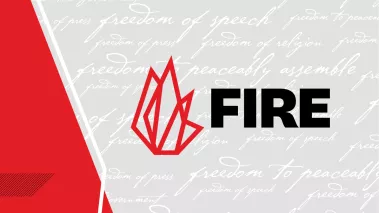Table of Contents
Oxy Asks California Court to Render the Leonard Law Powerless in Serious Cases of Censorship

On the Ides of March of this year, former Occidental College student Jason Antebi filed suit against his alma mater for an array of abuses it has taken FIRE the past months to fully recount. In the most recent back and forth in the legal battle, Oxy is largely relying on one very interesting (and very wrong) argument: that the Leonard Law protects only students who are currently enrolled at their respective universities.
The Leonard Law was passed in the early ’90s in order to combat the rise of speech codes on private campuses, including my alma mater Stanford. Thanks to California Education Code 94367 (known as “the Leonard Law”), the Stanford speech code was overturned in Corry v. Stanford, Case No. 74309 (1995) (that opinion is, for some reason, unpublished, a practice in California that keeps important decisions from becoming binding precedent—a scandalous practice, in my opinion, but a topic for another time).
The Leonard Law reads:
(a) No private postsecondary educational institution shall make or enforce any rule subjecting any student to disciplinary sanctions solely on the basis of conduct that is speech or other communication that, when engaged in outside the campus or facility of a private postsecondary institution, is protected from governmental restriction by the First Amendment to the United States Constitution or Section 2 of Article 1 of the California Constitution.
(b) Any student enrolled in a private postsecondary institution that has made or enforced any rule in violation of subdivision (a) may commence a civil action to obtain appropriate injunctive and declaratory relief as determined by the court. Upon motion, a court may award attorney’s fees to a prevailing plaintiff in a civil action pursuant to this section. [Emphasis added.]
Oxy is trying to take advantage of the ambiguity of what “enrolled” means. Oxy would like it to mean “any student who is currently enrolled” at a university; therefore Jason, who is no longer a student at Oxy, could not sue under the law. Any ambiguity in the law, however, is easily cleared up by the plain intent of the law as stated in Deering’s California Codes Annotated: “It is the intent of the Legislature that a student shall have the same right to exercise his or her right to free speech on campus as he or she enjoys when off campus.”
If the intent of the law is taken seriously, the only possible interpretation of this language is that the Leonard Law protects students enrolled at the time of the harm as opposed to Oxy’s suggested “currently enrolled” interpretation. If the Leonard Law does not protect any student not currently enrolled, then any student who has been expelled or has graduated loses his or her legal recourse; therefore, students in California would enjoy only a shadow of the protections afforded students off campus, in clear violation of the intent of the law.
Take, for example, Papish v. Board of Curators of University of Missouri, 410 U.S. 667 (1973), a seminal case in the history of student rights. Papish dealt with a student who was expelled from school for publishing a student newspaper many considered offensive. The Supreme Court held that “the mere dissemination of ideas—no matter how offensive to good taste—on a state university campus may not be shut off in the name alone of ‘conventions of decency’” and ordered that the student be reinstated. Under Oxy’s wishful interpretation of the Leonard Law, Papish would have no recourse, since she was not enrolled at the time of the lawsuit.
Other essential student First Amendment cases, such as Board of Regents v. Southworth, 529 U.S. 217 (2000), would fail under the Leonard Law, since the wronged students in those cases would have graduated by the time the case was decided.
A perverse consequence of Oxy’s proposed reading of the Leonard Law is that a California college could completely insulate itself from a free speech lawsuit by expelling any student it wishes to punish for protected speech, rather than giving him or her some lesser sanction. Imagine the shockwave this will create in California higher education if the California courts side with Oxy’s unjustified reading of the Leonard Law: Schools like Oxy would be faced with the choice: (1) suspend a student who offended other students or (2) simply expel him or her to protect the schools from a Leonard Law suit. Does this sound like the intent of a legislature that wished to grant students “the same right to exercise his or her right to free speech on campus as he or she enjoys when off campus”?
Oxy’s actions remain some of the worst I have seen at my time at FIRE. I have sometimes been disappointed by the California courts in the past, but I trust the courts will understand that granting Oxy’s interpretation of the Leonard Law will render the law essentially meaningless when the violations of free speech are the most serious.
Recent Articles
FIRE’s award-winning Newsdesk covers the free speech news you need to stay informed.

Victory in Virginia! Gov. Youngkin defends free speech by vetoing bill on ‘altered’ political media

DEI statements could function as ideological firewalls, new study finds

Is it ‘hate speech’ to say Jesus needs a haircut?
